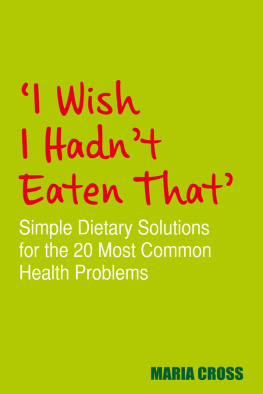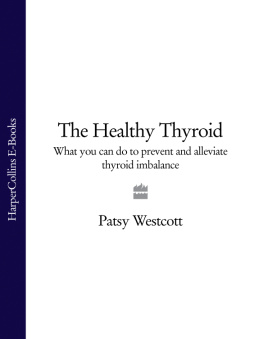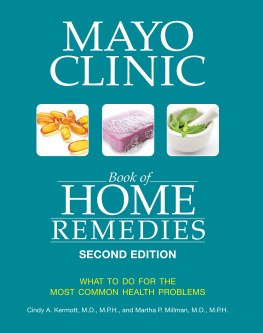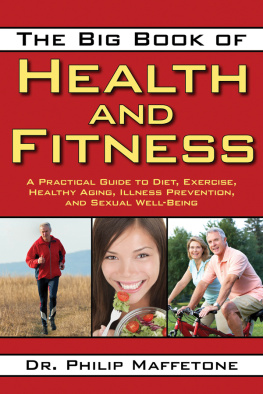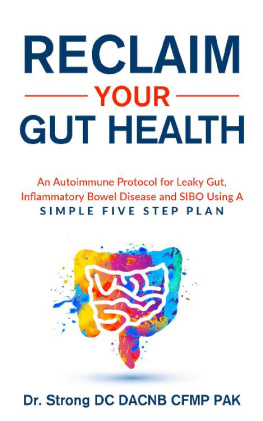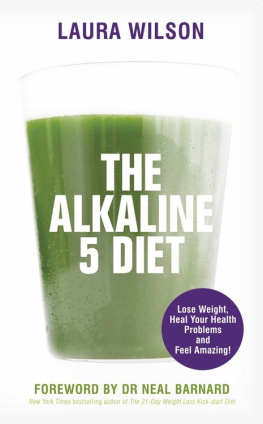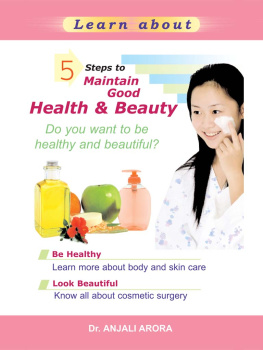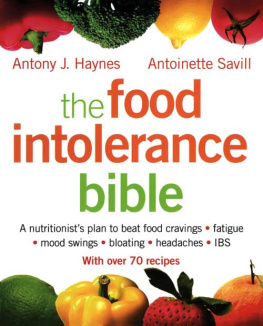
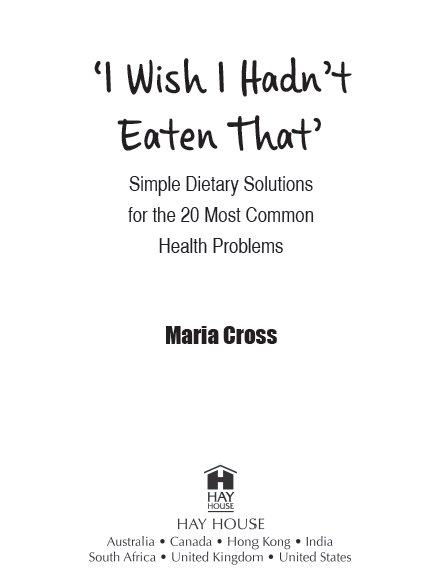
Maria Cross, 2011
The moral rights of the author have been asserted.
All rights reserved. No part of this book may be reproduced by any mechanical, photographic or electronic process, or in the form of a phonographic recording; nor may it be stored in a retrieval system, transmitted or otherwise be copied for public or private use, other than for fair use as brief quotations embodied in articles and reviews, without prior written permission of the publisher.
The information given in this book should not be treated as a substitute for professional medical advice; always consult a medical practitioner. Any use of the information in this book is at the readers discretion and risk. Neither the author nor the publisher can be held responsible for any loss, claim or damage arising out of the use, or misuse, or the suggestions made or the failure to take medical advice.
A catalogue record for this book is available from the British Library.
ISBN 978-1-84850-374-8 in print
ISBN 978-1-84850-558-2 in epub format
ISBN 978-1-84850-557-5 in Mobipocket format
For Peter
Contents
Everyones a nutrition expert nowadays. Whatever your health problem youll find a legion of pundits lining up to tell you what to eat from your mother, partner and work colleague to celebrity chefs on TV. Every newspaper, whatever its persuasion or profundity, is determined to give you the best, most current advice on the latest meal-time trend. Watching the dressing-down of the obese and benighted for their dietary misdemeanours on prime-time TV has become a national sport. Theres so much nutrition information available now that half the country can talk eloquently of the role of friendly bacteria and omega-3 fatty acids, or the crucial need for antioxidants to combat free radicals. Yet it wasnt that long ago that we barely knew a vitamin from a mineral, or a protein from a carbohydrate.
This modern dietary enlightenment is a good thing. We are becoming increasingly aware, for example, that feeding children a diet of junk food can transform them into manic monsters. That what we eat and drink can have a profound effect on mood, and that we shouldnt necessarily believe everything that food manufacturers would have us believe. Our recently acquired nutritional nous has steered us away from blind faith in official pronouncements of safety and wholesomeness towards an intuitive awareness of what is good and right to eat and what is decidedly questionable.
This increased awareness has come about at a time when the British palate has, thankfully, become more sophisticated and started demanding better quality food. No longer the laughing stock of food fashionistas, British food is deeply trendy these days. So too is nostalgia for home cooking. Once, the notion of cooking real food was parodied by adverts such as the Martian Smash men, hooting deliriously at the idea of anyone actually taking the time to boil a pan of spuds. Now we cant get enough home cooking, or we at least lament the hectic lifestyles which restrict quality kitchen-time. And if you lack the skills, you can learn from TV chefs who tempt the goddess within us all to return to home baking and simple culinary pleasures.
With the state of the nations health, a transition from gruel Britannia to traditional quality fare may be just the medicine we need. For the majority of people, however, interest in good food is yet to be translated into healthy eating habits. A quarter of adults are now classified as obese, and whatever it is they are eating it certainly isnt fresh fruit and vegetables. The latest national diet and nutrition survey reported that in 2008/9 only 33 per cent of women and 37 per cent of men participating in the survey were meeting the five-a-day guidelines. Worse still, only 7 per cent of girls and 22 per cent of boys aged 11 to 18 were doing so.
There are many other people who may not be obese but who are still not achieving optimum health with a sense of total wellbeing. They might not have rampant heart disease, diabetes or cancer, or any other chronic disease currently terrorizing the Western world, but they are still simply not well. They may have an intuitive understanding that diet is in some way part of the problem, but the link between illness and nutrition remains elusive.
I have been practising as a nutritional therapist since 1994, advising clients on a variety of health problems. I see the same problems over and over again, and very rarely am I unable to help those clients eliminate or greatly reduce their symptoms. Most of these people are not seriously ill, but their symptoms are debilitating enough to make them feel, at times, quite wretched. I have come to identify 20 common symptoms which people complain of most frequently. They are:
- lack of energy (tired all the time is the most common complaint I hear)
- weight gain
- constipation
- diarrhoea
- bloating and/or flatulence
- frequent colds/infections
- aching joints
- mild depression and/or anxiety
- dry skin and/or eyes
- headaches
- acne
- food cravings
- poor circulation
- insomnia
- poor memory and/or concentration
- mood swings
- premenstrual syndrome
- period pain
- skin rashes, itching, eruptions, etc.
- water retention.
I sometimes think of my clients as the walking wounded. More often than not, they look fine enough. Indeed, they dont usually have any diagnosed medical condition as such. They hold down jobs sometimes very important ones at that and bring up children whilst running busy households. Their juggling skills are heroic. Most but by no means all of my clients are women and their narratives reveal extraordinary multi-tasking skills. But hardy as they appear, inside they are struggling with exhaustion, stress and anxiety about their health.
Because of my experience, I am convinced that there are very few truly healthy people. Most people appear to be functioning below par, and have just learned to adapt their lives to cope with at least one of the above 20 symptoms. This book is intended for all those of you who are perfectly healthy but not very well; who have had a raft of tests all confirming your good health, contrary to the way you actually feel; those of you who know that your health is not what it could and should be, but are frustrated when you try to find answers in conventional places.
This is what a typical, fed-up client will say to me:
Ive seen my GP. Hes done all the tests and says there is nothing wrong with me. Im not going back because he thinks Im making it up and just wants to put me on antidepressants.
It is frustrating to have to soldier on with health problems without knowing why youve got them, or what to do about them. This frustration is not all bad, however, when it engenders a determination to take control of your own health and get to the root of the matter. The result can be enlightening and uplifting, and often involves complementary therapy.
Nutritional therapy can be extraordinarily effective. It does require effort; the client does all the work, based upon recommendations made. But the pay-off for this approach is empowerment for the client, not to mention results.
Nutrition is not the answer to every health problem, because nothing in life is ever that simple. But it is the cornerstone of good health, and should always be the starting point on the road to total wellbeing. A good nutritional therapist will look at the patients collection of symptoms, cross-reference with his or her diet and lifestyle and join up the dots. This book is designed to help you take this same approach in order to achieve a long-term, effective solution to those persistent health problems which, like background noise, just wont go away.
Next page
